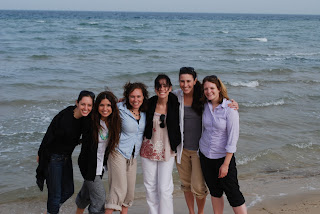It’s a hot, bright, cloudless afternoon in Jeddah and our last in KSA. Despite our desire to see more facets of this country (outside of the gleaming city centers, government chambers, and world-class hotels) we have learned a great deal about this often paradoxical place. The scene before me seems to sum it all up: 400 thread count sheets on my bed, non-alcoholic budweiser in my fridge, a call to prayer blaring from a nearby mosque, men in SUV’s flying through a round-a-bout, and niqab clad women slipping through the shadows.
Saudi Arabia is a beautiful country, filled with generous, proud, and welcoming people. Throughout the week I’ve been surprised by the efficiency of the Saudi government, and King Abdullah’s important social and economic reforms. The speed at which this country is growing is truly a marvel, regardless of (or perhaps, in spite of) its vast oil reserves. King Abdullah University of Science and Technology (KAUST) is a prime example. It is the most impressive educational facility I have ever seen, and it was built in merely 3 years - a feat I have difficulty comprehending. The country is developing so quickly, it appears there is no time for nostalgia. The Saudis have strategically plucked out the traditional elements they would like to carry with them as they grow, without a backward glance at others. Throughout our visit we often had difficulty communicating our desire to see historic landmarks, experience Bedouin culture, or spend time traversing the rambling mosaic of Jeddah’s Old City. Riyadh’s shopping mall (a clone of Tysons II) is the new beacon of Saudi culture.
Outside my window the red sea’s teal waters quench a thirsty landscape, and if I were a man, I would certainly surrender for a dip. However, I am not, and that is a deal-breaker in Saudi Arabia. It is very difficult to reconcile the role of women in this country, even as we try to conceive of the world with Saudi lenses. I can respect that religious tradition is paramount here for all aspects of life, however, Saudi’s stringent interpretation used to justify gender segregation just doesn’t jive well for Americans indoctrinated with the idea that separate is inherently unequal. Cultural relativism aside, I simply cannot accept that women should not have the same opportunities and human rights as men. It appears that King Abdullah is open to cautious, calculated social reform, which is certainly a cause for optimism. Many women we spoke with said they felt a real current of change vibrating through KSA, and noted the real question is not “if,” but “when.” Still, the king’s health is a giant question mark, and women’s rights have a history of fluctuation in the kingdom.
This tension between tradition and modernity, with both elements prized equally, was the most apparent phenomenon I noticed while in Saudi Arabia. As the kingdom seeks to modernize as quickly as its oil reserves can carry it, it will continue to strive for a calculated balance between the two. Whether the scale will tip in either direction remains to be seen. I can say, however, that it is a fascinating juggling act to behold. Shokran, Saudi Arabia, for giving me a front row seat.









 It didn't seem like we were having quite as much fun as the families sitting in their cars, so we headed back to the hotel to sit by our hotel's gorgeous pool. Of course women can't swim, but lying in the sun is nice too, especially when it's this nice out. Except that women can't lie down, they can only sit. The lounge chairs are only on the men's side of the pool, and can't be moved. The pool boy offered to uncover the straight-backed chairs and tables around the corner in the "family section," but we eventually gave up and went inside. Normally I would go work out in these instances, but women aren't allowed to use the gym. Sigh.
It didn't seem like we were having quite as much fun as the families sitting in their cars, so we headed back to the hotel to sit by our hotel's gorgeous pool. Of course women can't swim, but lying in the sun is nice too, especially when it's this nice out. Except that women can't lie down, they can only sit. The lounge chairs are only on the men's side of the pool, and can't be moved. The pool boy offered to uncover the straight-backed chairs and tables around the corner in the "family section," but we eventually gave up and went inside. Normally I would go work out in these instances, but women aren't allowed to use the gym. Sigh.




















